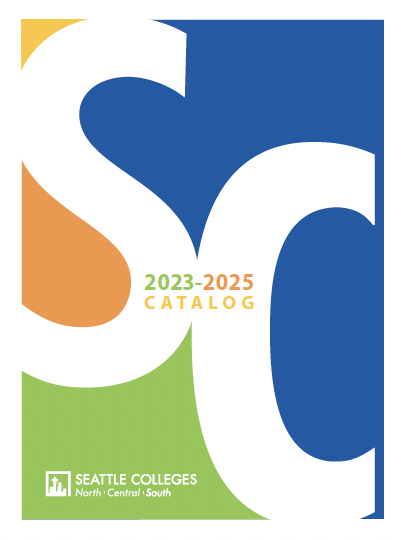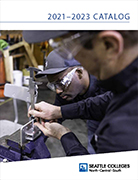Academic Catalog
The 2019 - 2021 College Catalog is available for downloading via the PDF files below. The catalog has been subdivided into smaller PDFs for your convenience. Select one or more to download and print, or select individual pages within a PDF.
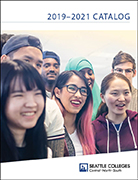
- Introduction (pp. 1 - 45)
- Seattle Central College (pp. 46 - 99)
- North Seattle College (pp. 100 - 150)
- South Seattle College (pp. 151 - 201)
- Course Descriptions (pp. 202 - 357)
- Faculty/Administration (pp. 358 - 378)
The 2018 - 2019 College Catalog is available for downloading via the PDF files below. The catalog has been subdivided into smaller PDFs for your convenience. Select one or more to download and print, or select individual pages within a PDF.
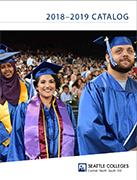
- Introduction (pp. 1 - 46)
- Seattle Central College (pp. 47 - 94)
- North Seattle College (pp. 95 - 152)
- South Seattle College (pp. 153 - 212)
- Course Descriptions (pp. 224 - 384)
- Faculty/Administration (pp. 385 - 406)
The 2016 - 2018 College Catalog is available for downloading via the PDF files below. The catalog has been subdivided into smaller PDFs for your convenience. Select one or more to download and print, or select individual pages within a PDF.
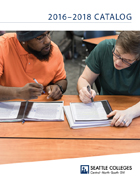
- Introduction (pp. 1 - 46)
- Seattle Central College (pp. 47 - 94)
- North Seattle College (pp. 95 - 152)
- South Seattle College (pp. 153 - 212)
- Course Descriptions (pp. 224 - 384)
- Faculty/Administration (pp. 385 - 406)
- Index (pp. 407 - 416)
- Full Catalog
The 2014 - 2016 College Catalog is available for downloading via the PDF files below. The catalog has been subdivided into smaller PDFs for your convenience. Select one or more to download and print, or select individual pages within a PDF.
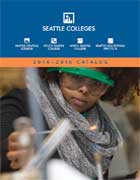
- Introduction (pp. 1 - 47)
- Seattle Central College (pp. 48 - 80)
- North Seattle College (pp. 81 - 123)
- South Seattle College (pp. 124 - 168)
- Course Descriptions (pp. 186 - 321)
- Faculty/Administration (pp. 322 - 346)
- Index (pp. 347 - 352)
- Full Catalog
The 2012 - 2014 College Catalog is available for downloading via the PDF files below. The catalog has been subdivided into smaller PDFs for your convenience. Select one or more to download and print, or select individual pages within a PDF.
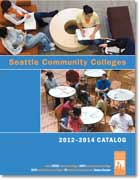
- Introduction (pp. 1 - 48)
- Seattle Central College (pp. 49 - 84)
- North Seattle College (pp. 85 - 124)
- South Seattle College (pp. 125 - 169)
- Course Descriptions (pp. 190 - 320)
- Faculty/Administration (pp. 321 - 345)
- Index (pp. 346 - 352)
- Full Catalog
The 2010 - 2012 College Catalog is available for downloading via the PDF files below. The catalog has been subdivided into smaller PDFs for your convenience. Select one or more to download and print, or select individual pages within a PDF.
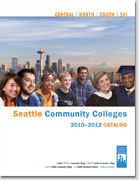
- Introduction (pp. 1 - 44)
- Seattle Central College (pp. 45 - 80)
- North Seattle College (pp. 81 - 122)
- South Seattle College (pp. 122 - 163)
- Course Descriptions (pp. 178 - 306)
- Faculty/Administration (pp. 307 - 330)
- Index (pp. 331 - 336)
- Full Catalog
The 2008 - 2010 College Catalog is available for downloading via the PDF files below. The catalog has been subdivided into smaller PDFs for your convenience. Select one or more to download and print, or select individual pages within a PDF.
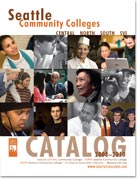
- Introduction (pp. 1 - 40)
- Seattle Central College (pp. 41 - 76)
- North Seattle College (pp. 77 - 120)
- South Seattle College (pp. 121 - 156)
- Course Descriptions (pp. 169 - 301)
- Faculty/Administration (pp. 302 - 324)
- Index (pp. 325 - 335)
The 2006 - 2008 College Catalog is available for downloading via the PDF files below. The catalog has been subdivided into smaller PDFs for your convenience. Select one or more to download and print, or select individual pages within a PDF.
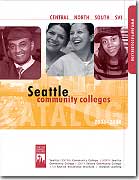
- Introduction (pp. 1 - 40)
- Seattle Central College (pp. 41 - 74)
- North Seattle College (pp. 75 - 116)
- South Seattle College (pp. 117 - 156)
- Course Descriptions (pp. 169 - 306)
- Faculty/Administration (pp. 307 - 328)
- Index (pp. 329 - 335)
The 2004 - 2006 College Catalog is available for downloading via the PDF files below. The catalog has been subdivided into smaller PDFs for your convenience. Select one or more to download and print, or select individual pages within a PDF.
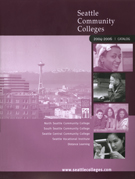
- Introduction (pp. 1 - 30)
- Seattle Central College (pp. 129 - 172)
- North Seattle College (pp. 31 - 82)
- South Seattle College (pp. 83 - 128)
- Course Descriptions (pp. 185 - 299)
The 2002 - 2004 College Catalog is available for downloading via the PDF files below. The catalog has been subdivided into smaller PDFs for your convenience. Select one or more to download and print, or select individual pages within a PDF.
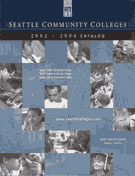
- Introduction (pp. 1 - 28)
- Seattle Central College (pp. 111 - 151)
- North Seattle College (pp. 29 - 72)
- South Seattle College (pp. 73 - 110)
- Course Descriptions (pp. 165 - 278)
The 2000 - 2002 College Catalog is available for downloading via the PDF files below. The catalog has been subdivided into smaller PDFs for your convenience. Select one or more to download and print, or select individual pages within a PDF.
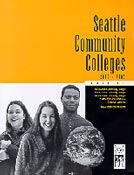
- Introduction (pp. 1 - 28)
- Seattle Central College (pp. 111 - 151)
- North Seattle College (pp. 29 - 72)
- South Seattle College (pp. 73 - 110)
- Course Descriptions (pp. 165 - 278)
Changes in courses and programs that develop after the catalog is printed are submitted to the district website. Use the search option at the top of the page to view the most up-to-date information for a class or program.
